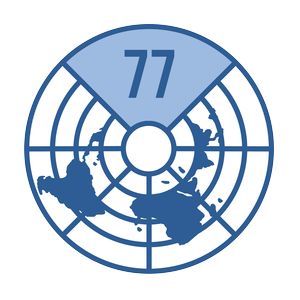
Group of 77 (G-77)
Groupe des 77
Grupo de los 77
Search Open Yearbook
This information is part of the Open Yearbook, a free service of UIA's subscription-based Yearbook of International Organizations (YBIO). It includes profiles of non-profit organizations working worldwide in all fields of activity. The information contained in the profiles and search functionality of this free service are limited.
The full-featured Yearbook of International Organizations (YBIO) includes over 77,500 organization profiles, additional information in the profiles, sophisticated search functionality and data export. For more information about YBIO, please click here or contact us.
The UIA is a leading provider of information about international non-profit organizations. The aim of the Open Yearbook is to promote the activities of international non-governmental organizations (INGOs) and intergovernmental organizations (IGOs).
Contact Details
URL: https://uat.g77.org/
URL: http://www.g77.org/
Founded
1964-06-15
History
Available with paid subscription only.Aims
As the largest intergovernmental organization of developing states in the United Nations, provide the means for the countries of the South to articulate and promote their collective economic interests and enhance their joint negotiating capacity on all major international economic issues in the United Nations system; promote South-South cooperation for development.
Events
12 past events available with paid subscription only.Activities
Available with paid subscription only.Structure
Available with paid subscription only.Languages
Available with paid subscription only.Finance
Available with paid subscription only.Relations with Inter-Governmental Organizations
United Nations bodies:
- F-XF5828 - Comprehensive Nuclear-Test-Ban Treaty Organization (CTBTO);
- B-XB0971 - FAO;
- B-XB2183 - ILO;
- B-XB1383 - International Atomic Energy Agency (IAEA);
- B-XB1505 - International Civil Aviation Organization (ICAO);
- E-XE0128 - International Civil Service Commission (ICSC);
- F-XF1721 - International Fund for Agricultural Development (IFAD);
- B-XB1117 - International Maritime Organization (IMO);
- F-XF2266 - International Monetary Fund (IMF);
- B-XB1112 - International Organization for Migration (IOM);
- B-XB2622 - International Telecommunication Union (ITU);
- E-XE2639 - International Trade Centre (ITC);
- E-XE9922 - Joint Inspection Unit of the United Nations (JIU);
- E-XE2288 - Joint United Nations Programme on HIV/AIDS (UNAIDS);
- E-XK1312 - Office of the United Nations High Commissioner for Human Rights (OHCHR);
- B-XB0057 - Organisation for the Prohibition of Chemical Weapons (OPCW);
- E-XF6814 - Pan Caribbean Partnership against HIV and AIDS (PANCAP);
- E-XE4161 - UNEP;
- F-XJ2621 - UN Women;
- E-XE3381 - UNCTAD;
- E-XE3382 - UNDP;
- B-XB3383 - UNESCO;
- E-XE3016 - UNHCR;
- F-XF3380 - UNICEF;
- B-XE3386 - UNIDO;
- A-XA3375 - United Nations (UN);
- E-XE4174 - United Nations Economic Commission for Africa (ECA);
- E-XE4174 - United Nations Economic Commission for Africa (ECA);
- E-XE4176 - United Nations Economic Commission for Europe (UNECE);
- E-XE4175 - United Nations Economic Commission for Latin America and the Caribbean (ECLAC);
- E-XE4177 - United Nations Economic and Social Commission for Asia and the Pacific (ESCAP);
- E-XE4178 - United Nations Economic and Social Commission for Western Asia (ESCWA);
- E-XK1561 - United Nations Framework Convention on Climate Change - Secretariat (UNFCCC);
- E-XE6809 - United Nations Human Settlements Programme (UN-Habitat);
- E-XE6904 - United Nations Institute for Disarmament Research (UNIDIR);
- E-XE3387 - United Nations Institute for Training and Research (UNITAR);
- E-XK2002 - United Nations Office for Disaster Risk Reduction (UNDRR);
- E-XE4069 - United Nations Interregional Crime and Justice Research Institute (UNICRI);
- E-XE3574 - United Nations Office on Drugs and Crime (UNODC);
- E-XK0972 - United Nations Office for Project Services (UNOPS);
- F-XF5606 - United Nations Population Fund (UNFPA);
- E-XE1325 - United Nations Relief and Works Agency for Palestine Refugees in the Near East (UNRWA);
- E-XE3388 - United Nations Research Institute for Social Development (UNRISD);
- F-XK1600 - United Nations System Staff College (UNSSC);
- F-XF2488 - United Nations University (UNU);
- B-XB3408 - Universal Postal Union (UPU);
- B-XB3548 - WHO;
- F-XE3543 - World Food Programme (WFP);
- B-XB3635 - World Intellectual Property Organization (WIPO);
- B-XB3556 - World Meteorological Organization (WMO);
- B-XB2745 - UN Tourism;
- B-XF2527 - World Trade Organization (WTO).
Sub-Regional, Regional, Inter-Regional organizations and economic groupings, including: F-XK0563 - Non-Aligned Movement (NAM); E-XE1177 - South Centre.
Relations with Non-Governmental Organizations
Links with: F-XF2515 - IPS - Inter Press Service International Association; F-XF6706 - Inter Press Service (IPS); F-XF1170 - Third World Network (TWN).
Publications
Available with paid subscription only.Members
Available with paid subscription only.Type I Classification
Available with paid subscription only.Type II Classification
Available with paid subscription only.Subjects *
UN Sustainable Development Goals **
UIA Org ID
XF0728
** UN SDGs are linked to the subject classification.
← return to your search page to find additional profiles.
UIA allows users to access and make use of the information contained in its Databases for the user’s internal use and evaluation purposes only. A user may not re-package, compile, re-distribute or re-use any or all of the UIA Databases or the data* contained therein without prior permission from the UIA.
Data from database resources may not be extracted or downloaded in bulk using automated scripts or other external software tools not provided within the database resources themselves. If your research project or use of a database resource will involve the extraction of large amounts of text or data from a database resource, please contact us for a customized solution.
UIA reserves the right to block access for abusive use of the Database.
* Data shall mean any data and information available in the Database including but not limited to: raw data, numbers, images, names and contact information, logos, text, keywords, and links.